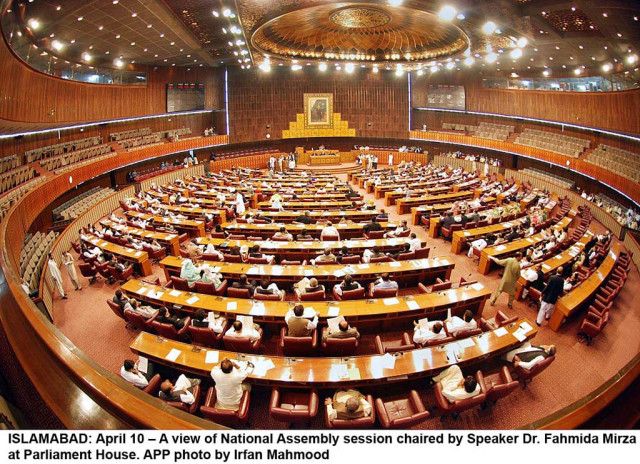How reserved seats for women are reserved for privileged
Almost all mainstream parties using the provision for benefit of powerful and connected

PHOTO: FILE
However, there is no denying the fact that all of these women started their political career from an advantageous position. All of them belonged to the uppermost strata of the society and politically influential families. Such inherent advantages also played role in their achieving exulted positions.
Despite tall claims, political parties have failed to ensure parity in women representation in the elected houses. Special provisions were included in the 1973 Constitution to encourage women participation and their representation in the legislative houses.
Parties nominate women candidates on hard to win seats
A major step was introducing reserved seats for marginalised segments including women and non-Muslims in the elected legislatures. This was done as a temporary measure to encourage their participation in the political affairs until they get equal opportunities.
Induction of reserved seats does increase the percentage of women in federal and provincial legislative houses, but it has failed to achieve the real objective – parity between male and female candidates.
In the National Assembly which elects prime minister of the county, only two women were elected as lawmakers after 1990 elections as the sunset clause of Constitution, through which reserved seats for women were introduced in the NA before 1977 elections, had expired after three election cycles.
Women could only participate on general seats now. The National Assembly formed after 1993 and 1997 general elections had only four and five women MNAs respectively.
This situation was remedied by former military ruler General Pervez Musharraf, who reintroduced reserved seats for women before 2002 general elections and now in the 342-member National Assembly, 60 seats are reserved for women and 10 for non-Muslims.
A political party gets one women's reserved seat for every 3.5 general seats.
Still short of meeting the UN-mandated target of 30 per cent women representation in all public and elected houses, it has been a substantial increase. However, the present method for distribution of reserved seats makes it largely a matter of securing the interests of powerful groups within the parties.
Reserved seats are allocated to the political parties from the priority lists they provide to the Elections Commission of Pakistan (ECP) before general elections, in proportion to the number of general seats they win in the direct contest.
The law provides heads of political liberty to nominate anyone on these seats. This discretion has mostly been misused to distribute quota to kith and kin as ‘friends and family packages’.
A cursory look at the lists of women candidate for reserved seats submitted by the mainstream parties to the ECP shows blatant misuse of authority in making nominations.
Mostly relatives and friends of the top leadership of parties are accommodated on women reserved seats, in many cases multiple members of the same family. Genuine workers are either ignored or placed at serial numbers that are unlikely to make it to the parliament.
Not only selected families are given preference. Most of the nominees belong to the urban, upper middle class and hardly any of them genuinely representing the rural women, a perusal of lists shows.
PML-N
The PML-N, the former ruling party, provided a list of its 27 nominees for the National Assembly’s reserved seats for women from Punjab quota. Except for a few, almost all the women nominees on this list have close connections within the party.
The PML-N Senator Jaffar Iqbal’s wife Ishrat Ashraf and daughter Zaib Jaffar as well as another close family member, Maiza Hameed, are on this list. Former MNA Pervaiz Malik and his son have been given tickets on general seats and his wife Shaista Pervez Malik is at number two on the priority list.
Tahira Aurangzeb is on the top of the priority list and her daughter Marriyum Aurangzeb, the former information minister, is at number four.
Former foreign minister Khawaja Asif is contesting the elections from Sialkot, while his wife, Musarrat, and a niece, Shaza Fatima, are among the lucky ones to be nominated on the reserved seats. Senator Mushahidullah Khan’s son is contesting elections from Karachi while his daughter Rida Khan is nominated on a reserved seat.
Zahra Wadood Fatemi – the wife of former adviser on foreign affairs Tariq Fatemi, is also there.
Interestingly private staff and social media team activists for Maryam Nawaz are also among the lucky ones nominated for membership of the National Assembly.
Those who could not be accommodated in the National Assembly, or who might not be chosen from the priority list for the NA, are accommodated in the reserved seats in provincial assemblies.
PPP
In its list for women reserved seats for Sindh Assembly, the province from where the PPP hopes to win once, Faryal Talpur and Dr Azra Pechuho – both sisters of the PPP Co-chairman Asif Ali Zardari – are at number one and two in the priority list. They are followed by former Sindh Assembly speaker Shehla Raza, who is at number three.
Both of Zardari’s sisters are also contesting the elections on general seats. Their names have been put for reserved seats to meet any eventuality in case they fail to win in direct elections.
Nida Khuro daughter of Nisar Khuro, and Parveen Qaimkhani and her daughter Rubina Qaimhhani, were both also nominated for reserved seats by the PPP.
PTI
Relatively new in the electoral politics, Imran Khan’s PTI which has emerged as a formidable political force since the 2013 general elections has included some new faces on its lists for the reserved seats.
Some diehard party workers like Talat Naqvi and Dr Zarqa Raheela Anwar, though made to the list for reserved seats, but their names come lower in the priority order than Mussarat Cheema, wife of Jamshed Cheema, who is also contesting Elections in NA-127 Lahore.
It is being said that Aleem Khan, PTI Central Punjab president, had a key role in the nomination of women on reserved seats and allegedly accommodated most people from his lobby on reserved seats.
Nafisa Khattak and Sajida Zulfiqar, both relatives of the Khyber-Pakhtunkhwa (K-P) former chief minister Pervez Khattak, are on top of the PTI’s list for the NA from K-P, the province from where Khan’s party hopes to win a sizeable number of seats in the lower house of parliament.
Daughter-in-law of former AJK President Sardar Ibrahim Khan, Noreen Ibrahim, a close relative of Azam Swati and Shah Farman, has also secured a spot on the party’s list for the NA. PTI’s diehard workers have been critical on these nominations. Women workers also staged a protest outside Khan’s house.
A prominent PTI worker from the K-P told The Express Tribune that 29 women from seven K-P districts had filed applications for reserved seats but not a single applicant was accepted. Rather, those living in Islamabad and other big cities were accommodated because of their strong connections.
According to a report compiled by Heinrich Boll Stiftung, a German foundation that works on issues like gender democracy, reserved seats were seen as a temporary special measure to cultivate a culture so that women participation in political affairs can increase.
Property distribution: MPA Achakzai demands equal rights for women
Under this system, political parties are allotted women’s reserved seats in proportion to the number of general seats they win through direct elections. This makes women’s reserved seats dependent on political parties, mostly the male members in the general elections.
As a result, women elected on these seats are often considered without a constituency and hence enjoy a lesser in status. This is despite the fact that many lawmakers have shown consistently excellent performance in legislative business and have even outperformed to their male counterparts.
The system also gives parties, rather than voters, more control on the reserved seats. Therefore, women chosen on reserved seats often feel more accountable to their parties than voters.
The presence of reserved seats for women also undermines their representation on general seats. Political parties often consider that women can be elected through reserved seats hence they tend to award general seat tickets to men, not realising that reserved seats are a temporary measure and women deserve equal treatment on general seats as well.
Part of the tendency is grounded in the patriarchal mindset that women cannot run campaigns and it is best for them to represent through reserved seats. These trends show that generally lower-middle class women political workers aspiring for reserved seats are at a disadvantageous position if they are not related to male parliamentarians. On the other hand, in many cases, family members of male politicians who have no political credentials of their own wind up in parliament.


















COMMENTS
Comments are moderated and generally will be posted if they are on-topic and not abusive.
For more information, please see our Comments FAQ